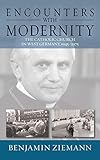Encounters with Modernity : The Catholic Church in West Germany, 1945-1975 / Benjamin Ziemann.
Material type: TextSeries: Studies in German History ; 17Publisher: New York ; Oxford : Berghahn Books, [2014]Copyright date: ©2014Description: 1 online resource (334 p.)Content type:
TextSeries: Studies in German History ; 17Publisher: New York ; Oxford : Berghahn Books, [2014]Copyright date: ©2014Description: 1 online resource (334 p.)Content type: - 9781782383444
- 9781782383451
- 261.8/30943
- online - DeGruyter
| Item type | Current library | Call number | URL | Status | Notes | Barcode | |
|---|---|---|---|---|---|---|---|
 eBook
eBook
|
Biblioteca "Angelicum" Pont. Univ. S.Tommaso d'Aquino Nuvola online | online - DeGruyter (Browse shelf(Opens below)) | Online access | Not for loan (Accesso limitato) | Accesso per gli utenti autorizzati / Access for authorized users | (dgr)9781782383451 |
Browsing Biblioteca "Angelicum" Pont. Univ. S.Tommaso d'Aquino shelves, Shelving location: Nuvola online Close shelf browser (Hides shelf browser)

|

|

|

|

|

|

|
||
| online - DeGruyter Negotiating Identity in Scandinavia : Women, Migration, and the Diaspora / | online - DeGruyter Living Translation : Language and the Search for Resonance in U.S. Chinese Medicine / | online - DeGruyter The Ethnographic Experiment : A.M. Hocart and W.H.R. Rivers in Island Melanesia, 1908 / | online - DeGruyter Encounters with Modernity : The Catholic Church in West Germany, 1945-1975 / | online - DeGruyter Pacific Futures : Projects, Politics and Interests / | online - DeGruyter The German Right in the Weimar Republic : Studies in the History of German Conservatism, Nationalism, and Antisemitism / | online - DeGruyter Unforgotten : Love and the Culture of Dementia Care in India / |
Frontmatter -- Contents -- Preface -- Abbreviations -- Introduction -- 1. Counting Piety: Church Statistics and Its Uses -- 2. In Search of Social Reality: Sociography -- 3. Representation and Contestation after the Council: Opinion Polling -- 4. Planning the Future of the Church: Organizational Research -- 5. “Humane” Scientific Approaches: Psychology and Group Dynamics -- Conclusion The Scientization of the Church as an Encounter with a Dangerous Modernity -- Bibliography -- Index
restricted access online access with authorization star
http://purl.org/coar/access_right/c_16ec
During the three decades from 1945 to 1975, the Catholic Church in West Germany employed a broad range of methods from empirical social research. Statistics, opinion polling, and organizational sociology, as well as psychoanalysis and other approaches from the “psy sciences,” were debated and introduced in pastoral care. In adopting these methods for their own work, bishops, parish clergy, and pastoral sociologists tried to open the church up to modernity in a rapidly changing society. In the process, they contributed to the reform agenda of the Second Vatican Council (1962-1965). Through its analysis of the intersections between organized religion and applied social sciences, this award-winning book offers fascinating insights into the trajectory of the Catholic Church in postwar Germany.
Mode of access: Internet via World Wide Web.
In English.
Description based on online resource; title from PDF title page (publisher's Web site, viewed 25. Jun 2024)


